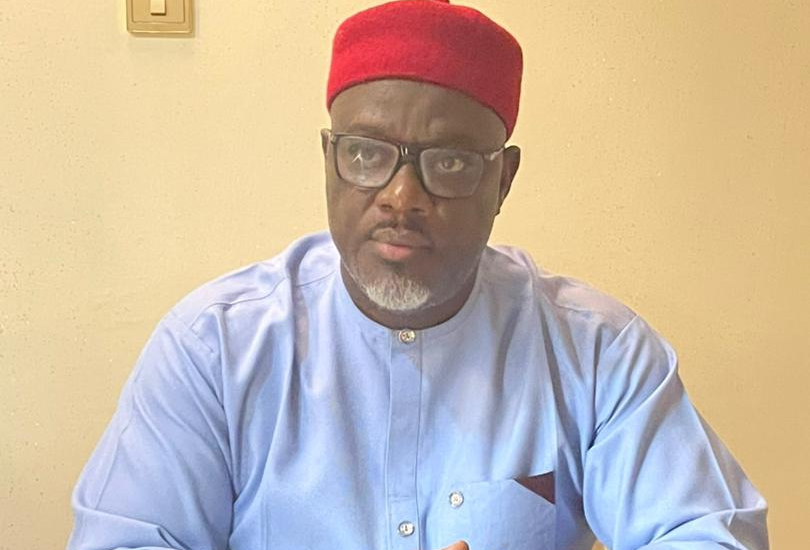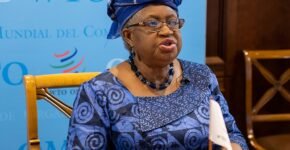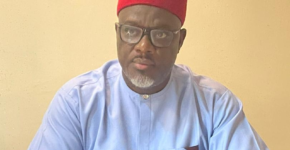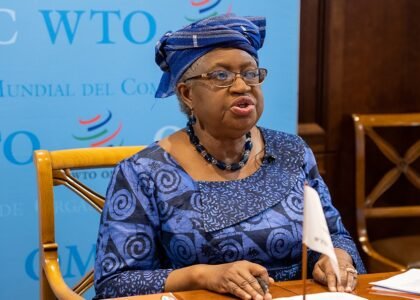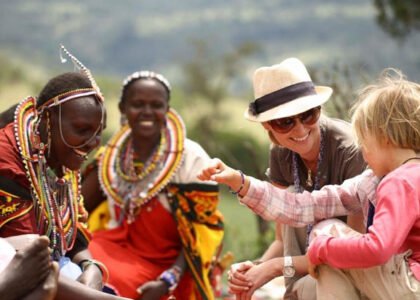Chuks Akamadu is the Managing Director/CEO of Afrocultour Limited – organisers of Songs of Nigeria Festival (SONIFES), Nigeria Entertainment and Economic Roundtable (NEER) and Africa Tourism and Creative Economy Expo (AFTCREE). He is an accomplished intellectual property lawyer, cultural scholar and tourism management expert. He is also the author of ‘Harnessing Culture for Economic Growth’ and had previously served as Secretary General of the Performing Musicians Employers’ Association of Nigeria (PMAN). In this interview with MSUGH ITYOKURA in Abuja, he reiterates the role of tourism as a major tool for economic diversification, growth and development.
DTN: You have an event coming up in November this year, tagged “Africa Tourism and Creative Economy Expo 2025”, can you tell us more about the event?
Akamadu: The Africa Tourism and Creative Economy Expo (AFTCREE, for short) is an Afrocultour initiative conceived to complement the various commendable public sector initiatives across Africa.
It is in furtherance of our commitment to mainstreaming culture and tourism into the economies of African States, for purposes of inclusive continental development and improved intra-continental trade.
The Expo aims to urge African countries to commit to significant increase in their tourism and creative economy annual budgetary allocations.
Inaugurate “Agenda 2030”, which would aspire to increase Africa’s contribution to global trade from less than three percent (3%) to at least ten percent (10 %) by the year 2030, through mainstreaming tourism and entertainment into the service industry.
Lastly, institute a peer review mechanism for African countries to compare notes bilaterally and multilaterally on emerging tourism and creative industry trends within the precincts of mutual profit.
Other objectives of the Expo include: fostering a culture of mutually-supportive sectoral collaboration amongst African countries to highlight investment opportunities in the tourism and creative industries, and attract investments to the value-chains.
Thankfully, this is in sync with the Renewed Hope Agenda of the Federal Government and the Federal Ministry of Arts, Culture, Tourism and Creative Economy under the transformational watch of Barr. Hannatu Musawa, is the Official Host Ministry of the Expo.
DTN: How can Africa’s natural heritage in the tourism sector be used for accelerated trade and economic growth on the continent?
Akamadu: We can only discuss how Africa can take due advantage of her unique natural heritage to compete more favourably if and when we have conquered the notion of tourism as being resident in the realm of leisure, and now do see it rightly as a major economic frontier that is capable of relocating our continent’s economy from the cesspit of dependency to sustainable shared prosperity.
Africa is blessed with numerous heritage sites with huge touristic value that can be deployed for the attainment of its accelerated trade and economic aspirations.
From the Namibian Spitzkoppe to Rwanda’s Mountain of Gorillas, Morocco’s Djemaa el Fna and the Pyramids of Giza in Egypt. We also have the Osun sacred groove in Nigeria, the Sossusvlei Dunes in Namibia, South Africa’s Table Mountains and the incredible all-year-round animal migration from Tanzania’s Ngorongoro Reserve to Kenya’s Masai Mara.
These are all choice tourist destinations with distinctive features that have largely remained Africa’s sleeping cash-cows over the decades. And it is for this reason and more that the forthcoming Expo is designed to be a wake-up call on Africa and her peoples.
We cannot be blessed and living in the midst of plenty, yet hungry, and still retain our status as the poorest region on the face of the planet.
DTN: Nigeria largely depends on oil revenue for its survival. How can culture and tourism improve the nation’s foreign exchange earnings?
Akamadu: This is one of the several issues my book, Harnessing Culture for Economic Growth, addresses extensively. It is also why Afrocultour’s slogan is “Mainstreaming Culture and Tourism into African Economies”.
My argument is simple. With the exception of agriculture, the culture-tourism sector which I prefer to call the “cultour sector” is, apart from being the largest employer of labour in the country, our low-hanging fruit in terms of economic diversification.
Therefore, improving Nigeria’s foreign exchange earnings can only happen if and when the government elects to recognise “culture” as a desirable economic path.
We need to reprioritise the sector through policy redirection, massive investment in cultural infrastructure, and the insistence on trained cultural and tourism experts to run the various institutions responsible for implementing the sector’s policies.
There is a reason why the Ministry of Justice is headed by a lawyer and the Ministry of Health is led by a health professional. Have you asked yourself why a non-academic does not superintend the National Universities Commission as executive secretary? And do you think that the government of United Arab Emirates was out of her mind when she merged her ministry of economy with tourism recently?
Look, it’s our wrong perception of tourism that has allowed Nigeria to operate an obsolete tourism policy that dates back to 1988. It is for the same reason that the Nigerian Tourism Development Master Plan of 2005 has also not been reviewed to date.
So, for us to earn forex from our vast cultural resources, we have first to view it as business, then treat it as such. This entails rethinking the entire sector, carrying out a SWOT analysis, needs assessment and investing massively in it with an eye on generating sustainable international tourist traffic.
Thankfully, we do not have to reinvent the wheel. We can safely borrow a leaf from Mauritius, UAE, Rwanda, China or even South Africa. Yes, we can!
DTN: Tourism is labour and capital-intensive. How can Africa at large develop infrastructure in the sector to contribute meaningfully to the GDP of African nations?
Akamadu: This is one of the major objectives of the Expo – to develop infrastructure in the sector would require sheer shared resolve and commitment amongst African Union member states in this regard.
I would like to note that in conceptualising the Expo, we took cognisance of Africa Agenda 2063, which was conceived to usher in “The Africa We Want” by the year 2063, as well as the legitimate aspirations of the AfCFTA.
The global trade outlook is such that Africa, being essentially an exporter of raw materials, is without a shred of doubt weak in goods exportation. Little wonder that while the United States of America exported goods valued at $2.1 trillion in 2022, Africa posted $614.58 billion the following year. You can see the disparity clearly – but it certainly doesn’t leave us helpless either.
The reason is simple: although we may not excel in goods exportation, the good news is that the service sector, which includes tourism and the creative industry, dominates global trade. In fact, the service sector accounts for two-thirds of global trade at present. Thankfully, Africa has comparative and competitive advantages in both tourism and the creative industry.
There is, therefore, every justification for Nigeria and all her sister-states in Africa to significantly increase their GDPs and reposition themselves in global trade through the culture corridor, by means of huge investment in culture infrastructure.
DTN: How can rural tourism and community-based initiatives broaden economic participation, ensuring that the benefits reach a wide segment of the locals?
Akamadu: In our local parlance, we say “politics is local”. But suppose there is anything more local than politics. In that case, it is tourism, because the tourist destinations are actually in the communities, and it is the local economy that benefits the most in every tourist endeavour or activity. Whether it is the driver that conveys the tourist to and fro the site or the akara seller, souvenir dealer, water hawker or the tour guide that takes the tourist around, what the tourist patronises is the local economy.
The beautiful thing about tourism is that its economic impact is both extensive and inclusive. Tourism effectively accommodates the skilled, the semi-skilled and the unskilled. It’s also gender-friendly and allows virtually all strata of society to play in it unhindered. So, community-based initiatives alongside infrastructure development are actually the catalyst needed to promote domestic tourism, which in turn has a positive impact on international tourism.
On the part of the government, there should be a deliberate policy to encourage rural dwellers to take ownership of rural tourism by viewing it as a profitable economic activity. That way, they would happily protect tourism infrastructure in their communities and complement both public and private sector efforts in marketing tourist sites and cultural tourism events for the benefit of all.
DTN: Have critical stakeholders embraced the concept of Africa Tourism and Creative Economy Expo, and what is your key expectation from the Expo?
Akamadu: It’s been awesome. Foremost, we are grateful to the Federal Ministry of Arts, Culture, Tourism and Creative Economy for accepting to go the whole hog with Afrocultour on this project. We do not take this for granted, especially being acutely aware that our partnership has flourished for over 15 years now. We are equally excited by the interest shown by the African Union Commission in the Expo and their readiness to take an active part in it.
In the course of articulating this Expo idea and designing its implementation framework, we toured the continent. We benefited from the wise counsel and kind input of sister-states and other tourism powerhouses. Algeria, Democratic Republic of Congo, Trinidad and Tobago, the UAE, South Africa and Botswana are some of the very receptive countries.
As for our key expectation from the Expo, we would like to secure, at least a minimum commitment from African States to increase Africa’s share of Global Trade from below 3% to ten percent (10%) by 2030 through the mainstreaming of culture and tourism into the economies of culturally rich and tourism-strong nations of Africa.
The peer review component of the Expo is going to provide an invaluable platform for African states to retrospect, compare notes, share experiences, identify gaps and collectively design an inclusive framework that would increase our continent’s share of global tourism revenue from less than 5% to at least 20% by the same year 2030 when our share of global trade would have risen from less than 3% to not less than 10%.

